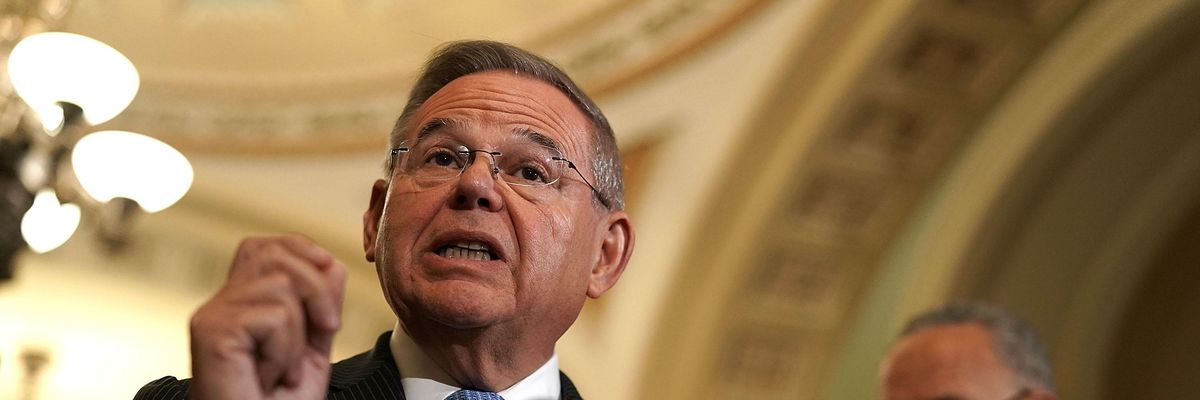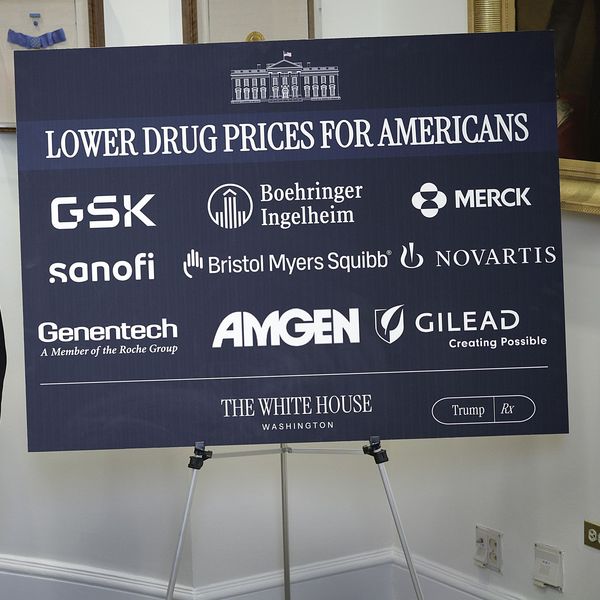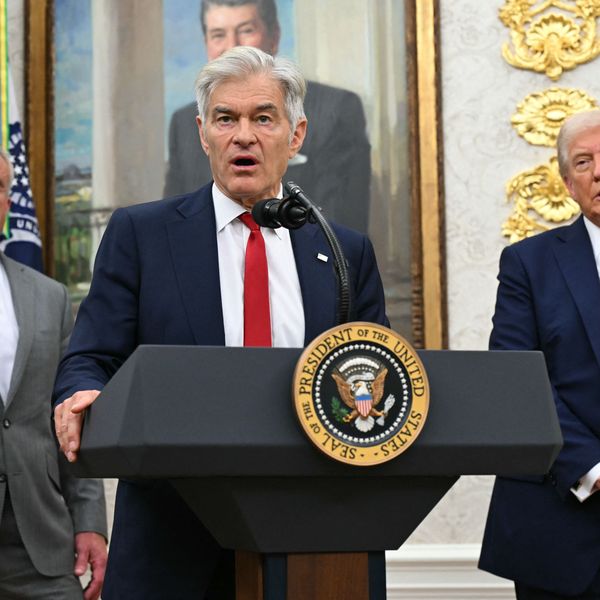
Sen. Bob Menendez (D-N.J.) (L) speaks as Senate Minority Leader Sen. Chuck Schumer (D-N.Y.) (R) listens during a news briefing after a weekly policy luncheon July 17, 2018 at the U.S. Capitol in Washington, D.C. (Photo: Alex Wong/Getty Images)
Critics See Menendez Villainy Equal to Sinema's on Medicare Drug Pricing Fight
"It's discouraging to see Sen. Menendez is on the wrong side of this fight rather than leading the charge for more affordable, accessible healthcare for all."
As U.S. Sen. Kyrsten Sinema continues to take heat for opposing Medicare drug pricing reforms in the Build Back Better package, another Big Pharma-backed Senate Democrat has come under fire in recent days for rejecting the popular cost-cutting provisions included in the budget reconciliation bill.
"Lowering prescription drug prices for patients, seniors, working families, and employers through negotiations in Medicare is not a controversial issue."
Sen. Bob Menendez (D-N.J.) amorphously explained Friday that "the cost of prescription drugs and lowering it is definitely something that should be proposed," but that the progressive proposals in the $3.5 trillion reconciliation package need "to be looked at in the context of what can pass and most importantly, what can guarantee that the consumer at the counter gets lower costs."
Menendez said last week he opposes the House's plan to reform drug prices-- H.R. 3, the Elijah Cummings Lower Drug Costs Now Act--partly because he believes pharmaceutical corporations would be unfairly taxed but is reportedly "waiting to see" a version being drafted by Senate Finance Committee Chair Ron Wyden (D-Ore).
H.R. 3, which was advanced by the House Ways and Means Committee last month as part of the Build Back Better package, would allow Medicare to negotiate lower drug prices, cap out-of-pocket medication costs to $2,000 for Medicare recipients, and require pharmaceutical companies that increase their prices faster than inflation to recompensate the federal government.
Menendez argues that H.R. 3 "does not guarantee" that either the government or consumers will save any money. The Congressional Budget Office disagrees. In 2019 the nonpartisan agency reported the measure would "increase revenues by about $46 billion over the 2020-2029 period" and would "reduce unified federal deficits by about $5 billion over that 10-year period."
\u201cThe Democrats opposing the Medicare price-setting bill in Congress \u2014 Kyrsten Sinema, Robert Menendez, and Scott Peters \u2014 "are among some of the biggest recipients of drug manufacturer lobbying funds." @aaboulenein @CarlODonnell26 https://t.co/oV5yc1iU3m\u201d— Bob Herman (@Bob Herman) 1635171817
Critics linked Menendez's opposition to the popular policies--Common Dreams reported earlier this month that 83% of respondents to a recent survey agreed that Medicare should be allowed to negotiate lower prescription drug prices--to Big Pharma's lobbying largesse.
A Reuters analysis published Monday found that many Democrats opposing drug pricing reform rank among the biggest recipients of Big Pharma campaign cash. These include Menendez, Sinema (D-Ariz.), and Rep. Scott Peters (D-Calif.), who have raked in around $1 million in combined industry donations so far this year.
Some of the world's biggest pharmaceutical corporations--including Johnson & Johnson, Merck, and Novartis--are headquartered in the Garden State. According to NJ Advance Media, Menendez has received $1.2 million from drug company employees over the course of his congressional career.
\u201cSo @SenatorMenendez is a YES on American families being price gouged for vital medicine they need to survive.\nAlmost 90% of NJ seniors approve of Medicare negotiations to lower Rx prices for ALL. Your constituents are asking you to stand with them Senator, not pharma companies.\u201d— New Jersey Citizen Action (@New Jersey Citizen Action) 1634664876
Maura Collinsgru, healthcare program director at New Jersey Citizen Action, wrote in a weekend op-ed that in the past, New Jerseyans "could always count on" Menendez "to stand up for healthcare," but "when it comes to lowering the price of prescription drugs, Sen. Menendez appears to have sided with drug corporations."
"Lowering prescription drug prices for patients, seniors, working families, and employers through negotiations in Medicare is not a controversial issue," Collinsgru continued. "In fact, almost everyone supports this solution, particularly since we already have negotiated prices in the Department of Veterans Health and in Medicaid, programs that pay half what Medicare pays for prescriptions because of negotiations."
"Rather than working with advocates, unions, and employers to ensure that we get real reform that will lower drug prices for as many New Jerseyans as possible, he appears to be opposing reform or working to limit it," she argued.
\u201cA push by progressives to lower the cost of prescription drugs via negotiations with Medicare has drawn the ire of Sens. Bob Menendez and Kyrsten Sinema, threatening its inclusion in final reconciliation bill. Hmmm. Might they get drug money?\u201d— Medea Benjamin (@Medea Benjamin) 1634554651
"Choosing to lower drug prices for 48 million seniors in Medicare Part D, while letting drug corporations continue to price gouge the 180 million people who have private coverage, is not a good deal for America," Collinsgru added.
As Sen. Bernie Sanders (I-Vt.) and other progressives regularly note, prescription drug prices are generally much higher in the U.S. than in the rest of the industrialized world.
Related Content

'Eye-Popping Rip-Off': Americans Pay Nearly Double Rest of World Combined for Top Meds
"It's discouraging to see Sen. Menendez is on the wrong side of this fight rather than leading the charge for more affordable, accessible healthcare for all--as we've seen him do in the past," Collinsgru lamented. "It's a betrayal of his legacy on healthcare that constituents won't soon forget."
An Urgent Message From Our Co-Founder
Dear Common Dreams reader, The U.S. is on a fast track to authoritarianism like nothing I've ever seen. Meanwhile, corporate news outlets are utterly capitulating to Trump, twisting their coverage to avoid drawing his ire while lining up to stuff cash in his pockets. That's why I believe that Common Dreams is doing the best and most consequential reporting that we've ever done. Our small but mighty team is a progressive reporting powerhouse, covering the news every day that the corporate media never will. Our mission has always been simple: To inform. To inspire. And to ignite change for the common good. Now here's the key piece that I want all our readers to understand: None of this would be possible without your financial support. That's not just some fundraising cliche. It's the absolute and literal truth. We don't accept corporate advertising and never will. We don't have a paywall because we don't think people should be blocked from critical news based on their ability to pay. Everything we do is funded by the donations of readers like you. Will you donate now to help power the nonprofit, independent reporting of Common Dreams? Thank you for being a vital member of our community. Together, we can keep independent journalism alive when it’s needed most. - Craig Brown, Co-founder |
As U.S. Sen. Kyrsten Sinema continues to take heat for opposing Medicare drug pricing reforms in the Build Back Better package, another Big Pharma-backed Senate Democrat has come under fire in recent days for rejecting the popular cost-cutting provisions included in the budget reconciliation bill.
"Lowering prescription drug prices for patients, seniors, working families, and employers through negotiations in Medicare is not a controversial issue."
Sen. Bob Menendez (D-N.J.) amorphously explained Friday that "the cost of prescription drugs and lowering it is definitely something that should be proposed," but that the progressive proposals in the $3.5 trillion reconciliation package need "to be looked at in the context of what can pass and most importantly, what can guarantee that the consumer at the counter gets lower costs."
Menendez said last week he opposes the House's plan to reform drug prices-- H.R. 3, the Elijah Cummings Lower Drug Costs Now Act--partly because he believes pharmaceutical corporations would be unfairly taxed but is reportedly "waiting to see" a version being drafted by Senate Finance Committee Chair Ron Wyden (D-Ore).
H.R. 3, which was advanced by the House Ways and Means Committee last month as part of the Build Back Better package, would allow Medicare to negotiate lower drug prices, cap out-of-pocket medication costs to $2,000 for Medicare recipients, and require pharmaceutical companies that increase their prices faster than inflation to recompensate the federal government.
Menendez argues that H.R. 3 "does not guarantee" that either the government or consumers will save any money. The Congressional Budget Office disagrees. In 2019 the nonpartisan agency reported the measure would "increase revenues by about $46 billion over the 2020-2029 period" and would "reduce unified federal deficits by about $5 billion over that 10-year period."
\u201cThe Democrats opposing the Medicare price-setting bill in Congress \u2014 Kyrsten Sinema, Robert Menendez, and Scott Peters \u2014 "are among some of the biggest recipients of drug manufacturer lobbying funds." @aaboulenein @CarlODonnell26 https://t.co/oV5yc1iU3m\u201d— Bob Herman (@Bob Herman) 1635171817
Critics linked Menendez's opposition to the popular policies--Common Dreams reported earlier this month that 83% of respondents to a recent survey agreed that Medicare should be allowed to negotiate lower prescription drug prices--to Big Pharma's lobbying largesse.
A Reuters analysis published Monday found that many Democrats opposing drug pricing reform rank among the biggest recipients of Big Pharma campaign cash. These include Menendez, Sinema (D-Ariz.), and Rep. Scott Peters (D-Calif.), who have raked in around $1 million in combined industry donations so far this year.
Some of the world's biggest pharmaceutical corporations--including Johnson & Johnson, Merck, and Novartis--are headquartered in the Garden State. According to NJ Advance Media, Menendez has received $1.2 million from drug company employees over the course of his congressional career.
\u201cSo @SenatorMenendez is a YES on American families being price gouged for vital medicine they need to survive.\nAlmost 90% of NJ seniors approve of Medicare negotiations to lower Rx prices for ALL. Your constituents are asking you to stand with them Senator, not pharma companies.\u201d— New Jersey Citizen Action (@New Jersey Citizen Action) 1634664876
Maura Collinsgru, healthcare program director at New Jersey Citizen Action, wrote in a weekend op-ed that in the past, New Jerseyans "could always count on" Menendez "to stand up for healthcare," but "when it comes to lowering the price of prescription drugs, Sen. Menendez appears to have sided with drug corporations."
"Lowering prescription drug prices for patients, seniors, working families, and employers through negotiations in Medicare is not a controversial issue," Collinsgru continued. "In fact, almost everyone supports this solution, particularly since we already have negotiated prices in the Department of Veterans Health and in Medicaid, programs that pay half what Medicare pays for prescriptions because of negotiations."
"Rather than working with advocates, unions, and employers to ensure that we get real reform that will lower drug prices for as many New Jerseyans as possible, he appears to be opposing reform or working to limit it," she argued.
\u201cA push by progressives to lower the cost of prescription drugs via negotiations with Medicare has drawn the ire of Sens. Bob Menendez and Kyrsten Sinema, threatening its inclusion in final reconciliation bill. Hmmm. Might they get drug money?\u201d— Medea Benjamin (@Medea Benjamin) 1634554651
"Choosing to lower drug prices for 48 million seniors in Medicare Part D, while letting drug corporations continue to price gouge the 180 million people who have private coverage, is not a good deal for America," Collinsgru added.
As Sen. Bernie Sanders (I-Vt.) and other progressives regularly note, prescription drug prices are generally much higher in the U.S. than in the rest of the industrialized world.
Related Content

'Eye-Popping Rip-Off': Americans Pay Nearly Double Rest of World Combined for Top Meds
"It's discouraging to see Sen. Menendez is on the wrong side of this fight rather than leading the charge for more affordable, accessible healthcare for all--as we've seen him do in the past," Collinsgru lamented. "It's a betrayal of his legacy on healthcare that constituents won't soon forget."
As U.S. Sen. Kyrsten Sinema continues to take heat for opposing Medicare drug pricing reforms in the Build Back Better package, another Big Pharma-backed Senate Democrat has come under fire in recent days for rejecting the popular cost-cutting provisions included in the budget reconciliation bill.
"Lowering prescription drug prices for patients, seniors, working families, and employers through negotiations in Medicare is not a controversial issue."
Sen. Bob Menendez (D-N.J.) amorphously explained Friday that "the cost of prescription drugs and lowering it is definitely something that should be proposed," but that the progressive proposals in the $3.5 trillion reconciliation package need "to be looked at in the context of what can pass and most importantly, what can guarantee that the consumer at the counter gets lower costs."
Menendez said last week he opposes the House's plan to reform drug prices-- H.R. 3, the Elijah Cummings Lower Drug Costs Now Act--partly because he believes pharmaceutical corporations would be unfairly taxed but is reportedly "waiting to see" a version being drafted by Senate Finance Committee Chair Ron Wyden (D-Ore).
H.R. 3, which was advanced by the House Ways and Means Committee last month as part of the Build Back Better package, would allow Medicare to negotiate lower drug prices, cap out-of-pocket medication costs to $2,000 for Medicare recipients, and require pharmaceutical companies that increase their prices faster than inflation to recompensate the federal government.
Menendez argues that H.R. 3 "does not guarantee" that either the government or consumers will save any money. The Congressional Budget Office disagrees. In 2019 the nonpartisan agency reported the measure would "increase revenues by about $46 billion over the 2020-2029 period" and would "reduce unified federal deficits by about $5 billion over that 10-year period."
\u201cThe Democrats opposing the Medicare price-setting bill in Congress \u2014 Kyrsten Sinema, Robert Menendez, and Scott Peters \u2014 "are among some of the biggest recipients of drug manufacturer lobbying funds." @aaboulenein @CarlODonnell26 https://t.co/oV5yc1iU3m\u201d— Bob Herman (@Bob Herman) 1635171817
Critics linked Menendez's opposition to the popular policies--Common Dreams reported earlier this month that 83% of respondents to a recent survey agreed that Medicare should be allowed to negotiate lower prescription drug prices--to Big Pharma's lobbying largesse.
A Reuters analysis published Monday found that many Democrats opposing drug pricing reform rank among the biggest recipients of Big Pharma campaign cash. These include Menendez, Sinema (D-Ariz.), and Rep. Scott Peters (D-Calif.), who have raked in around $1 million in combined industry donations so far this year.
Some of the world's biggest pharmaceutical corporations--including Johnson & Johnson, Merck, and Novartis--are headquartered in the Garden State. According to NJ Advance Media, Menendez has received $1.2 million from drug company employees over the course of his congressional career.
\u201cSo @SenatorMenendez is a YES on American families being price gouged for vital medicine they need to survive.\nAlmost 90% of NJ seniors approve of Medicare negotiations to lower Rx prices for ALL. Your constituents are asking you to stand with them Senator, not pharma companies.\u201d— New Jersey Citizen Action (@New Jersey Citizen Action) 1634664876
Maura Collinsgru, healthcare program director at New Jersey Citizen Action, wrote in a weekend op-ed that in the past, New Jerseyans "could always count on" Menendez "to stand up for healthcare," but "when it comes to lowering the price of prescription drugs, Sen. Menendez appears to have sided with drug corporations."
"Lowering prescription drug prices for patients, seniors, working families, and employers through negotiations in Medicare is not a controversial issue," Collinsgru continued. "In fact, almost everyone supports this solution, particularly since we already have negotiated prices in the Department of Veterans Health and in Medicaid, programs that pay half what Medicare pays for prescriptions because of negotiations."
"Rather than working with advocates, unions, and employers to ensure that we get real reform that will lower drug prices for as many New Jerseyans as possible, he appears to be opposing reform or working to limit it," she argued.
\u201cA push by progressives to lower the cost of prescription drugs via negotiations with Medicare has drawn the ire of Sens. Bob Menendez and Kyrsten Sinema, threatening its inclusion in final reconciliation bill. Hmmm. Might they get drug money?\u201d— Medea Benjamin (@Medea Benjamin) 1634554651
"Choosing to lower drug prices for 48 million seniors in Medicare Part D, while letting drug corporations continue to price gouge the 180 million people who have private coverage, is not a good deal for America," Collinsgru added.
As Sen. Bernie Sanders (I-Vt.) and other progressives regularly note, prescription drug prices are generally much higher in the U.S. than in the rest of the industrialized world.
Related Content

'Eye-Popping Rip-Off': Americans Pay Nearly Double Rest of World Combined for Top Meds
"It's discouraging to see Sen. Menendez is on the wrong side of this fight rather than leading the charge for more affordable, accessible healthcare for all--as we've seen him do in the past," Collinsgru lamented. "It's a betrayal of his legacy on healthcare that constituents won't soon forget."

